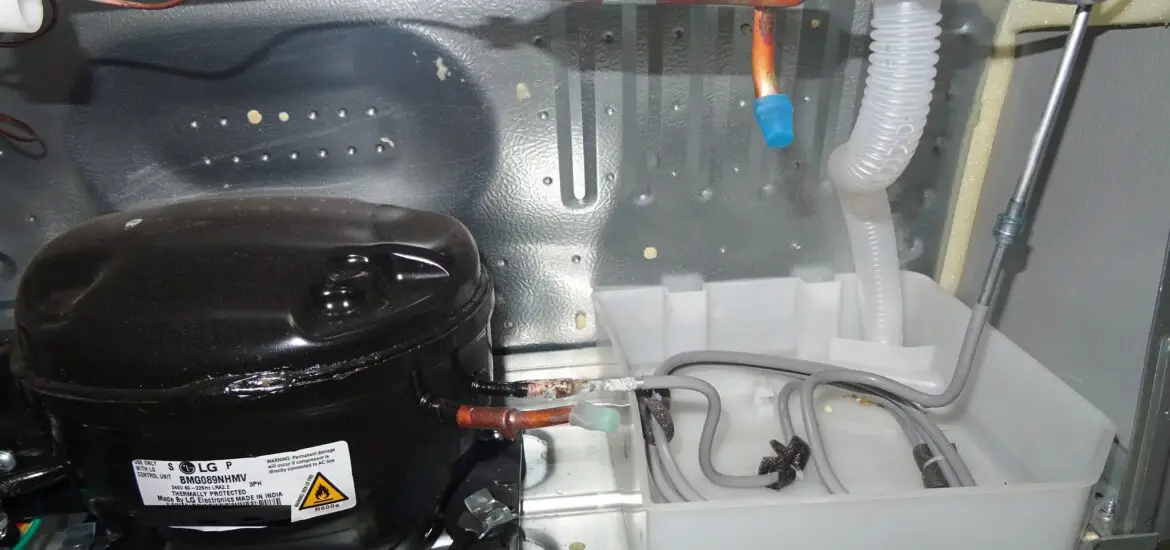In this article, we’ll compare the refrigerator compressor vs evaporator. We’ll explain in detail what each part does and why they are indispensable for the appliance’s optimal performance.

Table of Contents
The Role of the Refrigerator Compressor
The refrigerator compressor can be considered the heart of the cooling system. It’s usually located at the back of your fridge, encased in a metal shell for safety. Its primary function is to manage the refrigerant—essentially the lifeblood of the refrigerator’s cooling system.
When the temperature inside your fridge rises above a certain level, the thermostat signals the compressor to kick into action. It then draws in low-pressure, warm refrigerant gas from the evaporator. The compressor’s piston-like mechanism compresses this gas, increasing its pressure and temperature. This high-pressure, high-temperature gas then flows into the condenser coils, where it loses heat to the surrounding air and becomes a liquid. The liquid refrigerant goes through an expansion valve and turns back into a low-pressure gas, entering the evaporator for another cycle.
It’s important to note that the compressor consumes more energy than any other component in your fridge. Thus, a faulty compressor can significantly increase your electricity bill. Regular maintenance, like cleaning the coils and ensuring adequate airflow around the compressor, can prolong its lifespan.
The Function of the Evaporator
The evaporator plays an equally important but distinctly different role. It’s located inside the main compartment of your fridge, usually concealed behind a plastic or metal panel. The evaporator consists of coils made of metals like copper or aluminum, which are good conductors of heat.
Low-pressure gas refrigerant enters the evaporator coils from the expansion valve. The evaporator fan circulates air over these coils. As the air passes over, the refrigerant inside the evaporator coils absorbs the heat, causing the refrigerant to evaporate (hence the name). This process cools the air, which the fan then circulates back into the refrigerator, keeping your food and drinks cold.
Some modern refrigerators come with a self-defrosting feature for the evaporator coils. This means a small heating element is activated occasionally to melt away frost, keeping the evaporator efficient. If your fridge isn’t self-defrosting, you’ll have to manually defrost the evaporator, usually by turning off the fridge for a certain period.
Refrigerator Compressor vs Evaporator: The Key Differences
Location: The compressor is usually situated at the back of the refrigerator, outside the insulated food compartment. The evaporator is inside, often hidden behind a panel.
Function: The compressor is responsible for converting low-pressure gas into high-pressure gas and circulating the refrigerant. The evaporator absorbs heat from the internal environment and converts the refrigerant back into a low-pressure gas.
Material: Compressors are made of heavy-duty metals and are usually hermetically sealed to prevent leakage of refrigerant. Evaporators are made of metals like copper or aluminum that facilitate efficient heat transfer.
Maintenance: Compressors are typically more robust and last longer, but if they do fail, they can be expensive to replace. Evaporators may require periodic defrosting, especially in older models without a self-defrosting feature.
Energy Consumption: The compressor uses more energy than the evaporator. If it fails or operates inefficiently, it can significantly affect your electricity bill.
Check out these other articles…
Dent in Refrigerator Compressor: Fixed in 6 Easy Steps
Refrigerator Compressor Is Too Hot: Fixed in 4 Easy Steps
Refrigerator Compressor is Warm: 3 Easy Solutions
Refrigerator Compressor Cut Off Time: The Ultimate Guide
Refrigerator Compressor Only Runs for a Few Minutes: Fixed
Refrigerator Compressor Output Pressure: Comprehensive Guide
Is an Inverter Compressor Refrigerator Good? Detailed Answer
Common Problems and Troubleshooting
If your fridge isn’t cooling properly, it can be challenging to identify the culprit. For issues related to the compressor, you may notice a clicking noise, indicating it’s trying to start but failing. If the problem is with the evaporator, you might find that some areas inside your fridge are cooler than others.
It’s essential to diagnose the issue accurately for proper maintenance. If you’re unsure, consult a professional technician for accurate diagnosis and repair.